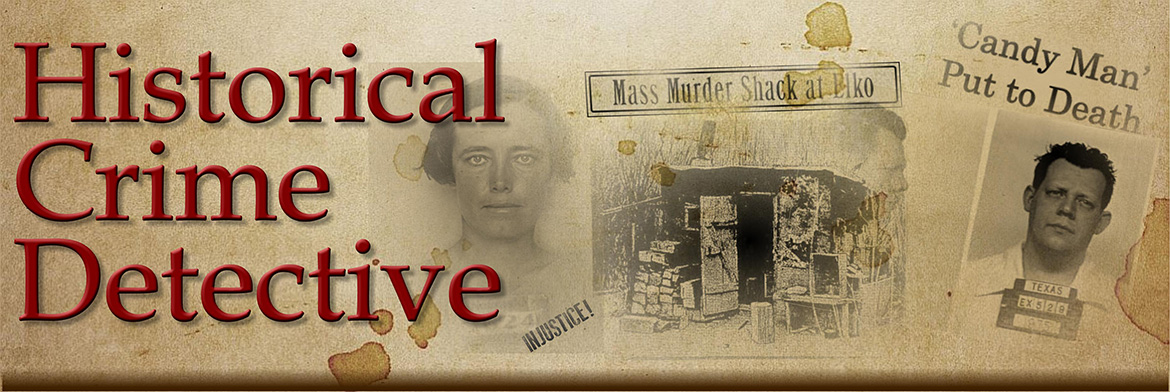The Criminal Career of Charles Mortimer, 1834-73
Story by Thomas Duke, 1910
“Celebrated Criminal Cases of America”
Part II: Pacific Coast Cases
Charles J. Flinn, alias Charles Mortimer, was born in New Hampshire in 1834, and moved to Sacramento, Cal., in 1861. He gained the reputation of being an honest and industrious man, but evil companions influenced him from the path of rectitude, and he finally became one of the most notorious criminals in the State of California.
He began with a series of petty offenses, but in 1862 he was sent to State Prison from San Francisco for one year for robbing Conrad Phiester of $800.
In 1864 he entered the room of Charles L. Wiggin, on Geary Street, in San Francisco, and after chloroforming him, stole money and jewelry valued at $1500.
While in jail, Mortimer professed to repent, and as an evidence of good faith, he volunteered to accompany Special Officer Rose into Santa Clara County where he claimed he had buried Wiggin’s property, and return it to its rightful owner. Rose accompanied him, and when they reached a desolate spot, Mortimer observed a place on the ground which had the appearance of having recently been disturbed, and he informed Rose that that was the spot where the property was buried.
The officer foolishly knelt down and started to examine the ground, and Mortimer took advantage of his position and kicked him on the head. Before the officer could recover, the prisoner secured his pistol and continued to beat the prostrate man about the head until he thought he was dead, and then made his escape.
In 1865 a prisoner was brought to San Francisco from Trinity County, en route to State’s Prison, to serve a seven-year term for robbery.
Officer Rose had recovered in the meantime, and when the prisoner was brought into the station he recognized him as Mortimer and would have shot the prisoner, if he had not been overpowered by brother officers.
Mortimer was liberated in 1872, and he then became the consort of a woman named Carrie Spencer, whom he met in a dance hall. He was never prosecuted for the assault on Rose, as that person had in the meantime left San Francisco for parts unknown.
In May, 1872, a woman named Caroline Prenel, a [prostitute] of a den on Waverly Place in San Francisco, was strangled and a man named Henry Beck was arrested for the murder and indicted by the grand jury. In a subsequent confession made in Sacramento, Carrie Spencer stated that Mortimer committed the crime, and to substantiate her confession she handed some of the murdered woman’s jewelry to the authorities which Mortimer had given to her. Beck was promptly exonerated but Mortimer was never tried for the crime, for at the time the Spencer woman made her confession, Mortimer was under investigation for the murder of a woman in Sacramento.
In 1851, a Mrs. Mary Shaw, commonly known as Mrs. Gibson, arrived in Sacramento, and gained considerable notoriety because of her strenuous opposition to the railroad company when it was alleged that they sought to appropriate her property for railroad purposes.
She conducted a saloon in Sacramento which was frequented by people of ill repute. About 7 a.m., September 20, 1872, a man named Chris Weiderholt was passing her saloon, when a man who frequented her place called to him and said that although the doors of the resort were all open, he could not find the proprietress.
Officer Wentworth was notified and in the woman’s bedroom her body was found with her head lying in a pool of blood, caused from a deep knife wound in her neck which severed the jugular vein. She was fully dressed and appearances indicated that she made a desperate battle for her life. In her death grasp she seized a bunch of reddish brown hair, evidently from the beard of her assassin. A glass partially filled with beer was also found in the room. Upon the arrival of a female relative of the deceased it was ascertained that a pocket in her dress had been torn out and $500.00 extracted there from.
About 2 a.m. on the morning of the murder, Officer Harris met Charles Mortimer. He had a bundle in his possession and his clothes were torn and blood was on his face. Harris interrogated him as to the cause of his condition and when Mortimer stated that he had been beaten by a couple of men, the officer accompanied him to his room at the Mechanics Exchange. When the officer learned of this murder he repaired to Mortimer’s room, and although he was absent, Carrie Spencer was in, and she was taken into custody. En route to the station, the officer met Mortimer and although he wore a reddish-brown beard when he met him at 2 a.m., Mortimer was now clean-shaven.
One of the employees of the hotel stated that he noticed Mortimer just before he went to the barber shop, and his face appeared as though some one had pulled out a bunch of his whiskers. Several dresses belonging to the murdered woman were found in Mortimer’s room.
It was proved that Mortimer and the Spencer woman were drinking in Mrs. Shaw-Gibson’s saloon on the day of the murder, and a ring found in Mortimer’s possession at the time of his arrest was identified by Henry Jefferson as the property of the murdered woman.
Dr. J. F. Rudolph, a chemist, analyzed the contents of the beer glass found near Mrs. Shaw-Gibson’s body and found strychnine present.
On October 10, 1872, the preliminary examination began in the Police Court and Mortimer was held to answer before the District Court, where his trial began on March 12, 1873. At this trial Carrie Spencer testified that on the morning of the murder Mortimer returned to their room, woke her up and showed her a bundle of clothes and some jewelry and about $300.00. She asked him where he got it and he replied that it came from the place where they were drinking that afternoon, and that he “croaked the old woman so that she could not squeal.”
The Spencer woman then produced several sheets of paper which were all written upon, and she stated that one day previous to the trial she visited Mortimer at his cell and he handed her this paper, and ordered her to commit its contents to memory and testify accordingly, or he would cut her throat from ear to ear.
On March 15, the case was submitted to the jury, and after deliberating thirty-five minutes they returned a verdict of guilty. On March 29, Mortimer was sentenced to be hanged on May 16.
On April 16, at 1:30 a. m., Deputy Sheriff Manuel Cross was on guard at the jail where Mortimer was awaiting execution. He heard the bell ringing at the gate, and taking his revolver in his hand, proceeded to ascertain the cause of a visit from any one at this unusual hour. When he was passing through the yard and was within ten feet of the gate he saw a man standing perfectly still. This man was without hat or shoes, his coat was turned inside out, and his face was partially masked. Upon drawing nearer the officer observed that the man had a pistol pointed directly at him.
Notwithstanding his disadvantage, Cross suddenly raised his pistol and fired twice, one bullet passing through this mysterious man’s chest and the other through his mouth—both fatal wounds. Although fatally wounded the man ran into the jail and directly to Mortimer’s cell, and fell dead in front of it without uttering a word.
The jailer then identified the remains as those of a man who had called previously, giving the name of Williams, and inquiring as to Mortimer’s welfare. Papers in his possession, however, indicated that his right name was W. M. Flinn, it being recalled that Flinn was Mortimer’s right name.
The next day, Mortimer was escorted to Wick & Clark’s undertaking parlors to view the body. He instantly recognized the remains as those of his 23-year-old brother, whom he had not seen for sixteen years, but he identified him through photographs recently received. The dead man bore an excellent reputation in the East, but risked his life to prevent any member of the family from dying on the gallows.
Mortimer was in absolute ignorance of his brother’s presence in Sacramento.
The condemned man took advantage of the tragic death of his brother and used it as an opportunity to feign insanity. He cut a lock of his dead brother’s hair from his forehead and, taking it back to his cell, he pretended to believe that it was his brother, and sat watching the hair day and night. He even pretended to be enraged if a fly came near it. He ceased these tactics, however, when he saw they would avail him nothing.
On May 15, 1873, he was executed in the County Jail, and before he mounted the scaffold he stated that his one regret was that he could not lay his hands on Carrie Spencer for one minute, and then he would gladly die.
—###—



